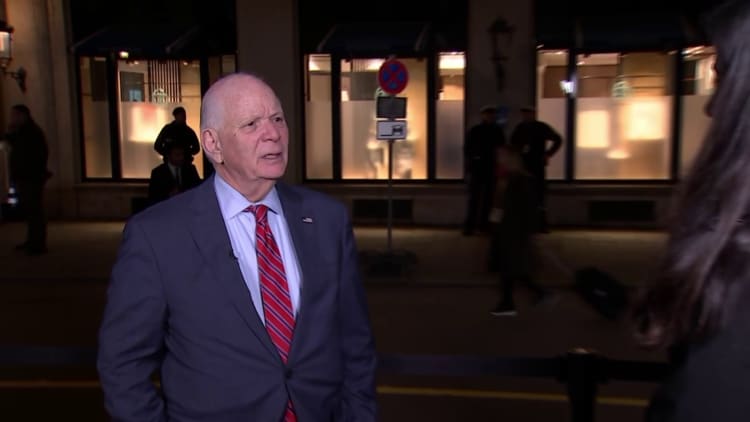‘China has a lot more to lose’: U.S. considering sanctioning Chinese firms aiding Russia’s war
- The U.S. is considering slapping sanctions on Chinese companies it believes are helping Russia fuel its war in Ukraine, members of Congress told CNBC.
- Lawmakers may “very soon” follow similar proposals from the EU, in what would mark the first direct penalties against Beijing over its alleged military support for Moscow.
- “China has to understand that the same kinds of sanctions which are beginning to really take hold in Russia ... can also be applied to China,” Senator Gerald Connolly said.

Munich, GERMANY — The U.S. is considering slapping sanctions on Chinese companies it believes are helping Russia fuel its war in Ukraine, members of Congress told CNBC, marking the first direct apportioning of blame toward Beijing since the start of the war.
Democratic Senator Gerald Connolly, member of the U.S. House Committee on Foreign Relations, on Saturday said that lawmakers were already considering such plans after similar measures were proposed last week by the European Union.
The provisions would mark the first direct penalties against Beijing despite long-held Western suspicions over its support for Russia’s military operations.
“China has to understand that the same kinds of sanctions which are beginning to really take hold in Russia and are affecting Russian productivity, economic performance and quality of life, can also be applied to China,” he told CNBC’s Silvia Amaro on Saturday at the Munich Security Conference.
“And frankly, China has a lot more to lose than Russia.U.S. sanctions could severely hurt a Chinese economy already in the doldrums, after a slower-than-anticipated Covid-19 recovery and turbulence in its real estate sector. But such a step could also hurt the U.S., given the countries’ trade interdependence, and this consideration has prompted caution from Washington in the past.
Still, Connolly said that would not deter such penalties, which could come “very soon.”
“My hope is the very threat of it — and the fact that the Europeans are really serious about this, which is a relatively recent development — ought to clarify some thinking in Beijing, I hope,” he said.
“If broad sanctions were applied to China, it would really hit home. And their economic performance right now is already weak. So I would hope China would calculate carefully that there are consequences around the corner for supporting Russia’s violence and depravity in Ukraine.”
Asked whether the U.S. is considering similar sanctions on China as those proposed by the EU, U.S. Senator Ben Cardin said Congress was currently looking into options with the Biden administration.
“It’s an area that we’re looking at, and Congress is working with the administration as to how we can enforce the sanctions against Russia, and that will require greater cooperation of other countries.”

CNBC reported last week that the European Union was preparing to impose sanctions on Chinese companies it believes are helping Russia circumvent Western penalties intended to curb its war in Ukraine.
The proposals, which would form part of the bloc’s 13th sanctions package since the start of Russia’s full-scale invasion, could be ready later this month to mark the war’s second anniversary. The EU’s top diplomat Josep Borrell said Monday that those plans had gained a new urgency in the wake of the death of Russian opposition leader Alexei Navalny on Friday.
The plans come amid ongoing reports that Beijing is propping up Moscow’s war economy.
A September CNBC investigation found that Chinese firms are playing an critical role in boosting Russia’s military capabilities, including via the trade of goods for use on the battlefield in Ukraine. A separate January report found that China has become key conduit in funnelling critical Western tech into Russia.
China’s foreign ministry and the U.S. National Security Council did not immediately respond to CNBC requests for comment.
China restrictions a ‘historic mistake’
A U.S. intelligence report stated that China “has also become an increasingly important buttress for Russia in its war effort, probably supplying Moscow with key technology and dual-use equipment used in Ukraine.”
However, Beijing has been forthright in its rejection of such accusations, saying that its trade with Moscow constitutes “normal economic cooperation,” and that it targets no “third party.” China has also previously attempted to mediate in the war in Ukraine, last year releasing a 12-point peace plan for the conflict that has yet to gain traction.
In a speech at MSC, China’s Foreign Minister Wang Yi said that trade should not be weaponized and said that any attempts to limit trade ties with his country would be a “historic mistake.”
“Those who attempt to shut China out in the name of derisking will make a historical mistake,” he said referring to existing restrictions implemented by the U.S. to limit, for instance, the trade of sensitive technologies.
Wang later met with U.S. Secretary of State Antony Blinken on the side lines of the conference, where he urged Washington to lift existing sanctions on Chinese companies and individuals and said the U.S. should not hurt China’s legitimate development rights.
Washington has imposed sanctions on various Chinese companies that it says are working with China’s military, despite the firms’ denials. U.S. sanctions have also been placed on individuals and entities accused of human rights abuses in the Chinese region of Xinjiang.
